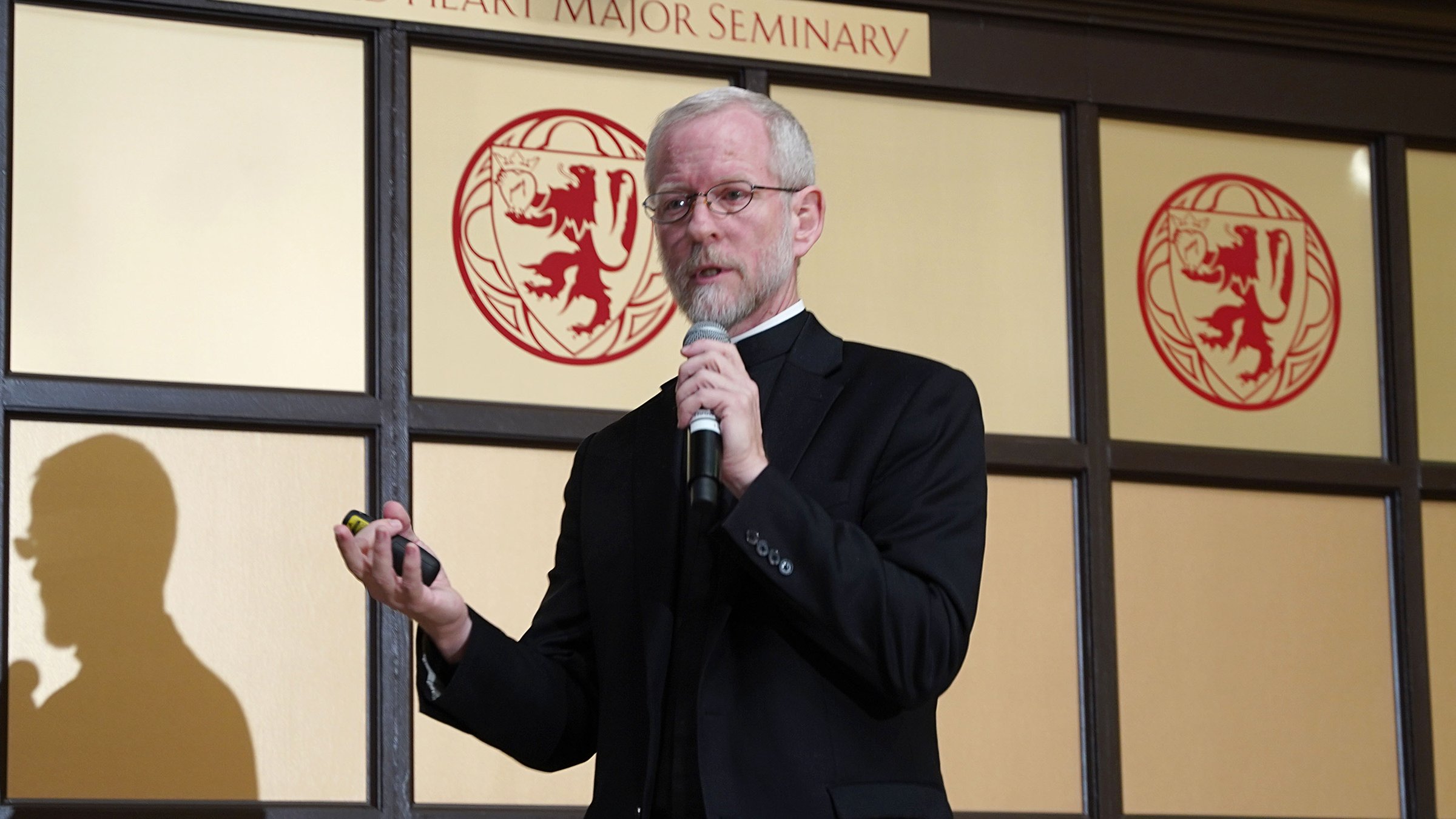Weighing the benefits and burdens of care is critical in making prudential judgments, Fr. Pacholczyk says at 'Jesus Wept' event
DETROIT — Clergy, evangelical charity and bereavement ministers gathered Oct. 4 at Sacred Heart Major Seminary for a conference on death and what it means to die well.
Catholic Funeral and Cemetery Services hosted “Jesus Wept: Bringing God’s People to Christ through the Funeral Rites,” focused on helping ministers better care for families as loved ones enter the final stages of life and after a person dies.
Fr. Tad Pacholczyk, director of education at the Philadelphia-based National Catholic Bioethics Center, gave the keynote address, “The Gift of Dying Well,” delving into the nuances, situations and “grey areas” a family might experience during the end of someone’s life.
Fr. Pacholczyk discussed end-of-life care, employing ordinary and extraordinary means in preserving life and the advantages of having a medial surrogate or proxy who can make conscious, well-informed decisions, as opposed to only testimonies such as “living wills” that might not cover every case in a prudent or sound manner.

“When you use due diligence, the grey indeed shrinks to a line. It’s no longer a grey area, but a line of understanding and a knowledge that, ‘Yes, I need to be on the right side of this line. I need to choose what is morally appropriate here,’” Fr. Pacholczyk said.
Fr. Pacholczyk introduced the audience to the "Ethical and Religious Directives for Catholic Health Care Services," a document developed by the United States Conference of Catholic Bishops that summarizes Catholic bioethics and how best to carry out the will of patients and a patient’s family.
“The document also discusses the use of proportionate means, weighing the benefits and the burdens of a treatment,” Fr. Pacholczyk said. “You also have to notice expense as well. What is the expense this will bring to the family? Will it be a burden? These are all factors to consider.”
Keeping family members in the loop about conversations between the patient, doctors and spiritual caregivers is key during end-of-life care, not only for the patient, but the patient’s family, Fr. Pacholczyk said.
“Complex factors will always be around when we are making a judgment, but judgment is what we are attempting to do here,” Fr. Pacholczyk said. “It’s our moral duty to make good, prudential judgements. Prudence, as you recall, is the highest of the cardinal virtues and is super important for us to seek, to live out that virtue. Making prudential decisions means you see all the variables in front of you and proceed with the best option going forward."

The conference also featured Sr. Esther Mary Nickel, RSM, director of sacred worship for the Archdiocese of Detroit, who spoke about educating families on the importance of Christian burial rites and how those rites care both for the souls of the deceased and the deceased’s family. Debbie Vallandingham, director of social work and grief care services at Angela Hospice, and Theodore Butkin, parish relationship manager with Catholic Funeral and Cemetery Services, also spoke.
Caring for a family after a funeral is often overlooked in funeral and cemetery care, said Marlon De La Torre, Ph.D., executive director of evangelization and missionary discipleship for the Archdiocese of Detroit.
Once, he recalled, a woman who had just lost her son asked De La Torre "where her son was."
“She wanted to know, specifically, what does the Church say about his state?” De La Torre said. “She wanted to know about his journey, where is he going. That for her was very important, and it’s something that is often overlooked when we are planning the funeral, the liturgy, the food. We don’t ask, 'Where is this person going?'”
Dr. De La Torre consoled the woman, reminding her it was right and proper to pray for him as she entrusted his soul to God.
“I told this woman that her son is God’s son, but he is still her son,” De La Torre said. “He is passed on, but you still recall his image and likeness. Do we not have pictures of remembrance in the home of those who passed away, elements of things used to remind us of them? Of course, we do. This is part of the imagery of being a son or daughter of God.”

All decisions when it comes to end-of-life care should be made with a focus on God's love, De La Torre said, which should be the ultimate focal point for pastors, hospice workers and chaplains.
“Looking through the progressive stages of life, we see what it means to have a proper, holy, Christian death,” De Le Torre said. “Looking to the Roman Missal: ‘Lord, for your faithful people, life is changed, not ended. When the body of an earthly dwelling lays in death, we can gain an everlasting dwelling place in heaven.’
“When I literally recited that to the woman who lost her son,” De La Torre recalled, “she broke down in tears. She had never heard death explained like that before.”
Catholic Funeral and Cemetery Services
Catholic Funeral and Cemetery Services is a ministry of the Archdiocese of Detroit. To learn more about pre-planning a Catholic funeral, visit CFCSdetroit.org.
Copy Permalink
Funerals and cemeteries












